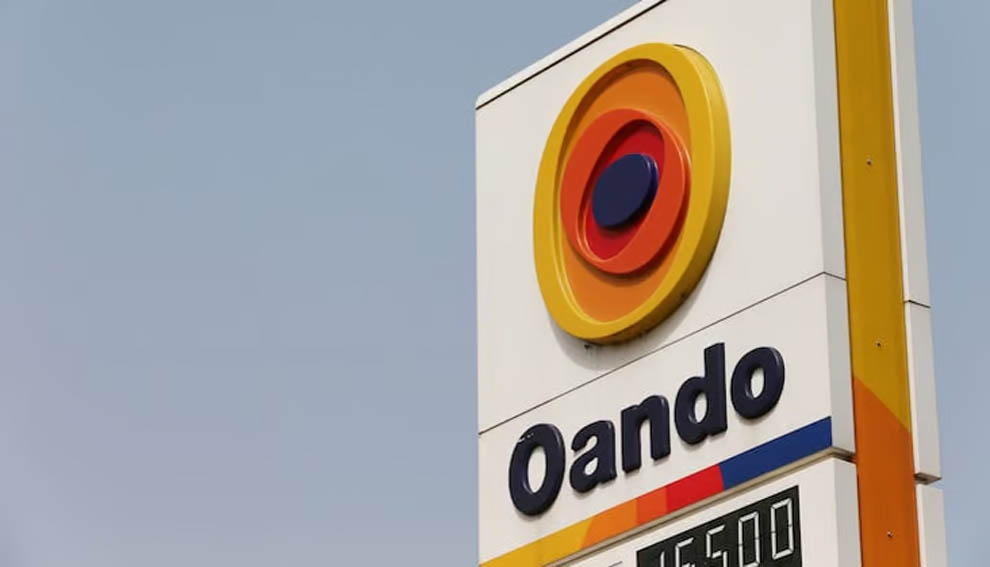Business
Just in: Oando completes acquisition of Agip Oil for $783m

Just in: Oando completes acquisition of Agip Oil for $783m
Oando Plc has successfully completed its acquisition of the Nigerian Agip Oil Company (NAOC) from Italian energy giant Eni for a total consideration of $783 million.
The company confirmed via a press release that the deal has been completed representing a significant milestone in Oando’s long-term strategy. The transaction includes reimbursement and consideration for the asset.
The acquisition is expected to solidify Oando’s position in Nigeria’s oil and gas sector, enhancing its operational footprint and expanding its upstream capabilities.
Recall the Italian oil major, Eni, reported it had received the approval of the Nigerian Upstream Petroleum Regulatory Commission (NUPRC) to sell its unit, Nigerian Agip Oil Company (NAOC), to Oando.
Eni said NAOC focuses on onshore oil and gas exploration and production as well as power generation in Nigeria.
Key Transaction Details
Increased Stake in Key Oil Blocks: The acquisition boosts Oando’s participating interest in Oil Mining Leases (OMLs) 60, 61, 62, and 63 from 20% to 40%.
This expands Oando’s ownership in all NEPL/NAOC/OOL Joint Venture assets, encompassing 40 discovered oil and gas fields, of which 24 are currently producing.
READ ALSO:
- N90bn fraud: Ex-Hajj Commission chairman released from EFCC detention
- Bank accounts of seven businessmen accused of defrauding Fouani N1.4bn frozen
- Man arrested after collecting N1.5m ransom on abducted children in Plateau
Enhanced Infrastructure Ownership:
Oando now has a stake in vital infrastructure, including approximately 1,490km of pipelines, three gas processing plants, the Brass River Oil Terminal, and the KwaleOkpai power plants (960MW capacity).
This acquisition further strengthens the company’s infrastructure footprints in Nigeria.
Significant Increase in Reserves: Oando’s total reserves have jumped from 505.6 million barrels of oil equivalent (MMboe) to over 1 billion barrels, representing a 98% increase based on 2022 reserve estimates.
Immediate Cash Flow Impact: The transaction is expected to be immediately cash generative, significantly enhancing Oando’s financial position and cash flows.
Wale Tinubu, Group Chief Executive of Oando PLC, highlighted the significance of this acquisition as the culmination of a decade-long effort that began with Oando’s acquisition of ConocoPhillips’ Nigerian assets in 2014.
Tinubu stated, “This is a win for Oando and every indigenous energy player as we take our destiny in our hands and play a pivotal role in the next phase of Nigeria’s upstream evolution.”
He further emphasized Oando’s commitment to optimizing the acquired assets’ potential while maintaining a focus on responsible practices, sustainable development, and contributing to Nigeria’s goal of boosting oil production.
Oando has cautioned that while it believes the acquisition will yield significant benefits, the transaction involves inherent risks and uncertainties.
These include potential changes in project parameters, the future price of crude oil, and risks associated with international operations.
The company advised investors to consider these factors when evaluating its future prospects.
Despite the uncertainties, Oando remains optimistic about the acquisition’s potential to drive growth and value creation, particularly as it explores diversification opportunities in clean energy, agri-feedstock, and energy infrastructure.
Just in: Oando completes acquisition of Agip Oil for $783m
Railway
Lagos Rail Mass Transit part of FG free train ride – NRC

Lagos Rail Mass Transit part of FG free train ride – NRC
The Nigerian Railway Corporation (NRC) has disclosed that the Lagos Rail Mass Transit (LRMT) trains are included in the Federal Government’s free train ride initiative for the Christmas and New Year celebrations.
The LRMT, which currently includes the Phase 1 Blue Line Rail and the Phase 1 of the Red Line Rail, operates under the Lagos Metropolitan Area Transport Authority (LAMATA).
This announcement was made by Ben Iloanusi, the Acting Managing Director of the NRC, during an interview on NTA News TV on Friday, following the launch of the initiative earlier that day.
While Iloanusi stated that Phase 1 of both the Blue Line and Red Line Rail projects are part of the program, LAMATA has yet to confirm this inclusion.
READ ALSO:
- Nigeria denies alleged plot to destabilise Niger Republic
- Navy arrests 19 Nigerians attempting to reach Europe by hiding on ship
- Troops arrest four Ambazonian rebels in Taraba
Iloanusi outlined the other routes benefiting from the scheme, which include the Lagos-Ibadan Train Service, Kaduna-Abuja Train Service, Warri-Itakpe Train Service, Port Harcourt-Aba Train Service, and the Bola Ahmed Tinubu Mass Transit in Lagos. Notably, little was previously known about the Bola Ahmed Tinubu Mass Transit service until this disclosure.
“Let me mention the routes where this free train service is happening. We have the Lagos-Ibadan Train Service, we have the Kaduna-Abuja Train Service, we have the Warri-Itakpe Train Service, we have the Lagos Rail Mass Transit trains, we have the Port Harcourt-Aba Train Service, and we have what we call the Bola Ahmed Tinubu Mass Transit, which is also in Lagos,” he stated.
Iloanusi provided operational updates, stating that passengers nationwide can access free tickets online or, for those unable to do so, at train stations where they will be profiled and validated.
He noted that passengers using NRC-managed services (excluding the Lagos Rail Mass Transit) should reserve tickets via the official website, www.nrc.gov.ng, with a valid ID required. He also advised travelers to plan, arrive on time, and bring valid identification.
Lagos Rail Mass Transit part of FG free train ride – NRC
Business
NNPC denies claim of Port Harcourt refinery shutdown

NNPC denies claim of Port Harcourt refinery shutdown
The Nigerian National Petroleum Company Limited (NNPCL) has denied claims in media reports that the newly refurbished Port Harcourt refinery has shut down.
The national oil company denied the claim in a press release issued by its Chief Corporate Communications Officer, Olufemi Soneye, on Saturday.
Soneye said the claim was false and urged Nigerians to disregard it. He stressed that the Port-Harcourt Refinery is fully operational.
READ ALSO:
- Like Ibadan, stampede claim 10 lives for Abuja Catholic church, 17 in Anambra
- Marketers react after NNPCL slashes petrol price to N899 per litre
- Electricity: We installed 184,507 meters, issued 50 licences in Q3, says FG
The statement read, “The attention of the Nigerian National Petroleum Company Limited (NNPC Ltd.) has been drawn to reports in a section of the media alleging that the Old Port Harcourt Refinery which was re-streamed two months ago has been shut down.
“We wish to clarify that such reports are totally false as the refinery is fully operational as verified a few days ago by former Group Managing Directors of NNPC.”
He noted that preparation for the day’s loading operation is currently ongoing, and added that claims of the shutdown are “figments of the imagination of those who want to create artificial scarcity and rip-off Nigerians.”
NNPC denies claim of Port Harcourt refinery shutdown
Business
CBN permits BDCs to buy up to $25,000 FX weekly from NFEM

CBN permits BDCs to buy up to $25,000 FX weekly from NFEM
The Central Bank of Nigeria (CBN) has granted Bureau de Change (BDC) operators temporary permission to purchase up to $25,000 weekly in foreign exchange (FX) from the Nigerian Foreign Exchange Market (NFEM).
The Central Bank of Nigeria (CBN) has granted Bureau de Change (BDC) operators temporary permission to purchase up to $25,000 weekly in foreign exchange (FX) from the Nigerian Foreign Exchange Market (NFEM).
This move, detailed in a circular dated December 19, 2024, is designed to meet seasonal retail demand for FX during the holiday period.
The circular was signed by T.G. Allu, on behalf of the Acting Director of the Trade and Exchange Department.
The arrangement will be in effect from December 19, 2024, to January 30, 2025.
Under the directive, BDCs may purchase FX from a single Authorized Dealer of their choice, provided they fully fund their accounts before accessing the market.
Transactions to occur at the prevailing NFEM rate
The transactions will occur at the prevailing NFEM rate, and BDCs are required to adhere to a maximum 1% spread when pricing FX for retail end-users.
READ ALSO:
- Badenoch’s negative portrayal of Nigeria Police unfair-PCRC
- Bitcoin price crashes to $95,000 as market continues to react to Federal rate cuts
- Bauchi high court dismisses blasphemy, cybercrime charges against Rhoda Jatau
All transactions conducted under this scheme must be reported to the CBN’s Trade and Exchange Department.
The circular read in part:
“In order to meet expected seasonal demand for foreign exchange, the CBN is allowing a temporary access for all existing BDCs to the NFEM for the purchase of FX from Authorised Dealers, subject to a weekly cap of USD 25,000.00 (Twenty-five thousand dollars only).
This window will be open between December 19, 2024 to January 30, 2025.
“BDC operators can purchase FX under this arrangement from only one Authorized Dealer of their choice and will be required to fully fund their account before accessing the market at the prevailing NFEM rate. All transactions with BDCs should be reported to the Trade and Exchange department, and a maximum spread of 1% is allowed on the pricing offered by BDCs to retail end-users.”
The CBN assured the general public that PTA (Personal Travel Allowance) and BTA (Business Travel Allowance) remain available through banks for legitimate travel and business needs.”
These transactions are to be conducted at “market-determined exchange rates” within the NFEM framework.
This initiative reflects the CBN’s strategy to stabilize the FX market and manage seasonal surges in demand.
CBN permits BDCs to buy up to $25,000 FX weekly from NFEM
-

 Railway10 hours ago
Railway10 hours agoLagos Rail Mass Transit part of FG free train ride – NRC
-

 metro2 days ago
metro2 days agoCourt stops customs from seizing imported rice in open market
-

 metro2 days ago
metro2 days agoFG transfers electricity market regulatory oversight in Lagos to LASERC
-

 metro2 days ago
metro2 days agoAfe Babalola: Court grants Dele Farotimi bail, barred from media interviews
-

 metro2 days ago
metro2 days agoIbadan stampede: Tinubu orders probe as death toll hits 40
-

 News2 days ago
News2 days agoAdebayo Ogunlesi, 2 other Nigerians make Forbes 50 wealthiest Black Americans list 2024
-

 metro3 days ago
metro3 days agoAbuja demolition: Soldiers attack FCTA officials, seize vehicles
-

 metro21 hours ago
metro21 hours agoIbadan stampede: Ooni reacts after arrest of ex-wife









